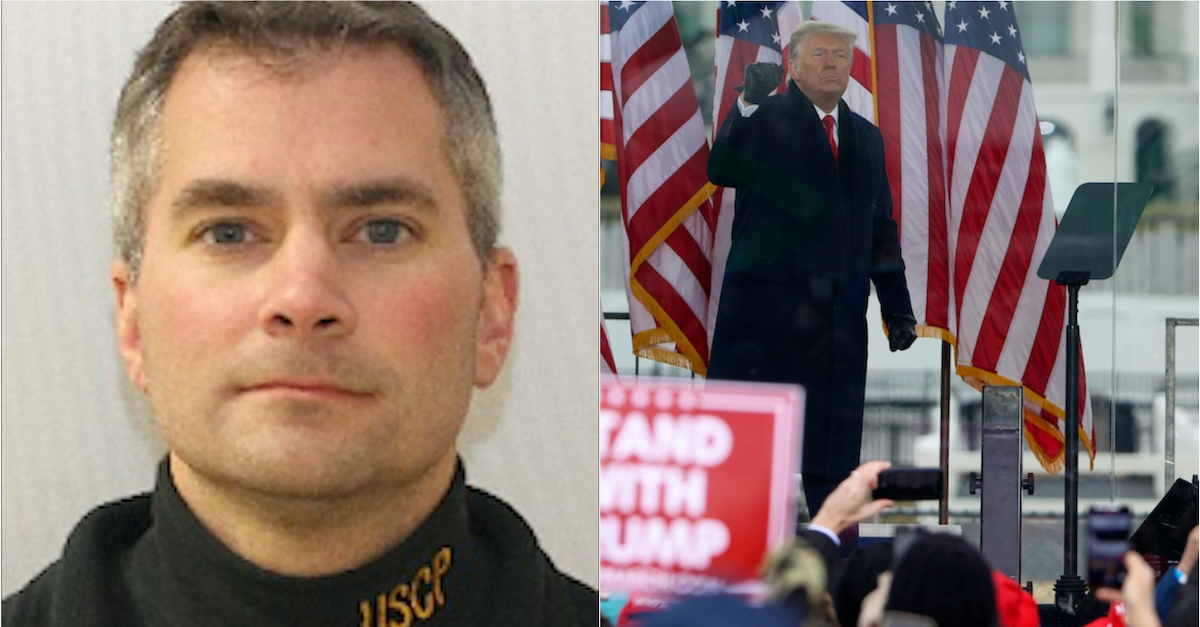
Fallen Capitol Police Officer Brian Sicknick’s estate sued Donald Trump for “inciting” the riot that included a pepper spray attack on him. (Photos via Capitol Police and Getty)
The Washington, D.C. judge overseeing the wrongful death lawsuit against former President Donald Trump filed by Brian Sicknick’s longtime partner over the Jan. 6 attack on the U.S. Capitol Complex swiftly and tidily rejected presidential immunity claims on Tuesday.
In a markedly terse analysis, U.S. District Court Judge Amit P. Mehta rejected the former president’s arguments out of hand.
“The court first addresses, and quickly disposes of, former President Trump’s assertion of immunity from suit,” the judge wrote in the 12-page memorandum opinion and order obtained by Law&Crime.
Officer Sicknick, who was pepper-sprayed in the face during the Capitol breach, died on Jan. 7, 2021. His death was attributed to a series of strokes that were incurred as a result of “all that transpired” the day before, according to the D.C. Medical Examiner’s Office.
On Jan. 5, 2023, Sandra Garza, named in Sicknick’s will as his domestic partner and executor of his estate, sued Trump and the two men who were convicted in connection with the attack on the fallen officer.
Julian Elie Khater is the man who used the pepper spray. He was sentenced to six years and eight months in prison after pleading guilty to two counts of assaulting, resisting or impeding officers using a dangerous weapon. The second man, George Tanios, brought the can of pepper spray but did not use it. He pleaded to a pair of misdemeanors and was sentenced to time served.
In her lawsuit, Garza alleges “Trump’s false and incendiary allegations of fraud and theft” and his “express calls for violence at the rally” are responsible for the “violent mob” that went on to attack the U.S. Capitol. Specifically, the lawsuit alleges the 45th president is responsible for “inciting” Khater’s and Tanios’s unlawful behavior.
All three of the named defendants moved to dismiss the lawsuit. Trump’s motion to dismiss was based on absolute immunity. That is, Trump claimed his actions at the rally on Jan. 6 were part and parcel of his role as then-U. S. president, and thus, he is immune from liability.
Unluckily for Trump, he made substantially the same argument in similar lawsuits that are at more advanced stages of litigation — and that argument has already been at least thrice rejected.
In March 2021, U.S. Capitol Police Officers James Blassingame and Sidney Hemby alleged Trump “inflamed, encouraged, incited, directed, and aided and abetted” his followers to assault them.
On Dec. 1, 2023, after losing the argument at the district court level, the U.S. Court of Appeals for the D.C. Circuit concurred with the lower court — rejecting presidential immunity. The appeals court found Trump was “not carrying out the official duties of the presidency” and was, rather, “acting as office-seeker, not officeholder.”
On Dec. 29, 2023, the appeals court had the occasion to revisit similar facts in another similar — and similarly procedurally advanced — lawsuit filed by Officer Conrad Smith and seven colleagues. This time, the court cited the Blassingame case as precedent.
“The salient question in Blassingame, we explained, was instead whether President Trump’s alleged actions reasonably could be understood as official functions of the presidency, in which case official-act immunity would attach, or, alternatively, whether they reasonably could be understood only as reelection activity, in which case it would not,” the per curiam order reads. “This case is indistinguishable from Blassingame in all relevant aspects.”
In a memo, Trump’s lawyers argued for immunity again in the Sicknick lawsuit. And, once again, the argument failed.
“That argument is now foreclosed by the D.C. Circuit’s decision in Blassingame v. Trump,” Mehta wrote.
“There, like here, President Trump argued that ‘a President’s speech on matters of public concern is invariably an official function, and he was engaged in that function when he spoke at the January 6 rally and in the lead-up to that day.’ But the Circuit held that, at the motion to dismiss stage, the plaintiffs had plausibly alleged that the former President’s alleged actions, including his speech at the Ellipse, were not within the outer perimeter of a President’s official responsibility.’ The same is true here.”
Immunity issues are salient in various legal controversies embroiling the former president — and the likely GOP standard-bearer for the upcoming 2024 presidential election.
Trump seeks to use an immunity defense in his Jan. 6 criminal case, which Special Counsel Jack Smith asked the U.S. Supreme Court to foreclose against in December. The high court declined.
Also in December, Trump sought to raise presidential immunity for his defense in an upcoming damages trial in an entirely separate civil case out of New York. In May 2023, writer E. Jean Carroll won a defamation verdict against Trump after it was determined that he sexually assaulted her in the 1990s — and then defamed her decades later when he denied her accusations.
Have a tip we should know? [email protected]